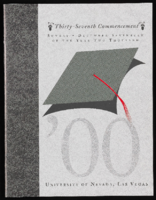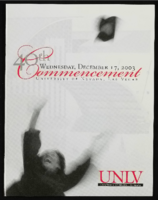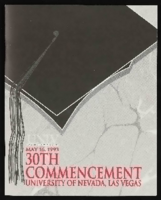Search the Special Collections and Archives Portal
Search Results

Sandra Candel oral history interview: transcript
Date
Archival Collection
Description
Oral history interview with Sandra Candel conducted by Elsa Lopez, Monserrath Hernández, and Barbara Tabach on October 03, 2019 for the Latinx Voices of Southern Nevada Oral History Project. Sandra Candel talks of her childhood growing up with her grandparents in Guadalajara, Jalisco after her mother immigrated to America. She moved to California to attend university before moving to Salt Lake City, Utah, where she raised her children and began homeschooling them. This path led to Sandra opening a Montessori school, igniting her interest in education. She talks of her pursuit of both a Masters Degree from Drexel University and a Doctoral Degree from the University of Nevada, Las Vegas (UNLV). Sandra concludes her interview with discussion of her research and current employment as a part-time instructor for the Department of Interdisciplinary, Gender, and Ethnic Studies at UNLV. Subjects discussed include: Guadalajara; Salt Lake City, Utah; Sensitive Teaching Practices; Multi-generational families.
Text

Andres Dominguez oral history interview: transcript
Date
Archival Collection
Description
Oral history interview with Andres Dominguez conducted by Marcela Rodriguez Campo, Laurents Bañuelos-Benitez, and Barbara Tabach on February 11, 2019 for the Latinx Voices of Southern Nevada Oral History Project. In this interview, Dominguez discusses his upbringing in Las Vegas, Nevada and growing up on the Eastside. He talks about the history of barbering in his family, and his path to becoming a barber. Dominguez describes the process of acquiring the barbershop at the El Cortez Hotel and Casino, and the significance of the location to his family. Lastly, Dominguez discusses his perspective on life, the importance of networking, and his decision in naming his shop Speakeasy Barbershop LV.
Text

Anita Tijerina Revilla oral history interview: transcript
Date
Archival Collection
Description
Oral history interview with Anita Tijerina Revilla conducted by Marcela Rodriguez-Campo on October 09, 2018 for the Latinx Voices of Southern Nevada Oral History Project. In this interview, Revilla discusses her early life in San Antonio, Texas. She talks about her decision to make education a priority, figuring out the college application process on her own, and her initial interest in social justice. Revilla talks about how her critical consciousness was developed, and her pedagogical approach to teaching. Revilla describes her role in the 2006 May Day march, advocating advocating for the queer community, and disrupting oppressive systems to increase educational access for students. Lastly, Revilla discusses ethnic studies and the history of inequality in the United States.
Text

Pablo Macias oral history interview: transcript
Date
Archival Collection
Description
Oral history interview with Pablo Macias conducted by Elsa Lopez, Monserrath Hernandez, and Claytee D. White on December 07, 2019 for the Latinx Voices of Southern Nevada Oral History Project. Pablo Macias was rasied in the small town of Carlin outside of Elko, Nevada. His father and mother met in Ogden, Utah where his father was working on railroad in Nevada and Utah. After finishing high school, he got a job at Elko Blacksmith Shop, where he learned to weld. After attending Northern Nevada Community College, he enrolled and graduated from UNR. After graduation, he took a position at Von Tobel Middle School in 1990 teaching Spanish and Physical Education. While working as a Spanish teacher in Rancho High School he enrolled in a Master's program at Nova Southeastern University, completing the program in education administration. He currently serves as the Associate Director of Corporate Work Study Program Operations for Cristo Rey St. Viator College Preparatory High School. Subjects discussed include: Education, Rancho High School, Von Tobel Middle School, Barrick Mining, and Cristo Rey.
Text

University of Nevada, Las Vegas (UNLV) 37th commencement program
Date
Archival Collection
Description
Commencement program from University of Nevada, Las Vegas Commencement Programs and Graduation Lists (UA-00115).
Text

University of Nevada, Las Vegas (UNLV) 40th commencement program
Date
Archival Collection
Description
Commencement program from University of Nevada, Las Vegas Commencement Programs and Graduation Lists (UA-00115).
Text

Margarita Rebollal oral history interview: transcript
Date
Archival Collection
Description
Oral history interview with Margarita Rebollal conducted by Marcela Rodriguez-Campo and Barbara Tabach on February 28, 2019 for the Latinx Voices of Southern Nevada Oral History Project. Margarita Rebollal is a lifelong community organizer and advocate for Latinx civic engagement and rights. She shares what it was like to grow up in Ponce, Puerto Rico and shares her childhood memories growing up on the island with her siblings. Rebollal also discusses the death of her father and the eventual move of her family to New York City, New York. She also recalls her education and teen years. Later, she would move to California, and eventually find her way to Las Vegas, Nevada in 1996. Rebollal discusses her passion for civic engagement and the many years serving the community, being most well-known for her role in founding the Puerto Rican Association of Las Vegas and the Hispanic International Day Parade of Nevada. Rebollal also discusses her campaign for the Ward 1 Las Vegas City Council seat.
Text

University of Nevada, Las Vegas (UNLV) 30th commencement program
Date
Archival Collection
Description
Commencement program from University of Nevada, Las Vegas Commencement Programs and Graduation Lists (UA-00115).
Text

June Monroe and Kazuko Atomura oral history interview: transcripts
Date
Archival Collection
Description
Oral history interviews with June Monroe and Kazuko Atomura conducted by Cecilia Winchell and Stefani Evans on July 14 and July 19, 2022 for Reflections: the Las Vegas Asian American and Pacific Islander Oral History Project. In the first interview, Kazuko Atomura describes her childhood in Taiwan and Tokyo, Japan, and shares both happy and difficult mememories of that time. Atomura eventually moved to Los Angeles, California, where she reconnected with a man she previously met in Japan. She married him and together had their daughter, June Monroe, and another son while living in Corpus Christi, Texas. After difficult medical procedures involving Atomura's husband and Monroe's younger brother, Brian, the family relocated to Las Vegas, Nevada. Monroe recalls attending Las Vegas High School and Bonanza High School, and the struggle of making new friends as a young person. In the second interview, the mother and daughter discuss racism, discrimination, and identity. Kazuko Atomura recalls her many experiences with discrimination as a result of both her appearance and language barriers. June Monroe discusses how she came to be proud of her Japanese heritage, while Atomura discusses some of the community activities she has been involved in since living in Las Vegas including the Japanese Culture Club and odori dancing. Then, both Atomura and Monroe discuss Monroe's brother, Brian, who received two kidney transplants; one from Monroe's father and one from Monroe herself. Atomura talks about the shrines she has built for Brian, the experience of him being on dialysis, care taking, and his final days. Monroe shares about her activism with organ donation, being regularly involved with the Nevada Donor Network and helping to pass significant pieces of legislation within the area of organ donation.
Text

Herman Jimerson, Ruth Jimerson-Carter, and Leon Carter Jr. oral history interview: transcript
Date
Archival Collection
Description
Herman Jimerson and his younger sister Ruth Jimerson-Carter, along with her husband Leon Carter Jr., gathered on March 3, 2021, to talk about their memories and experiences growing up in West Las Vegas—the Westside.
OH-03746 contains additional interviews with the Carter family that are not transcribed in this document. Contact special.collections@unlv.edu for more information.
Text
